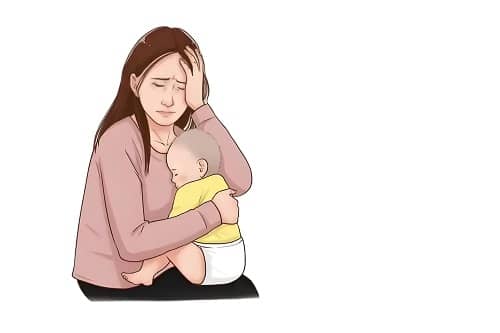Postpartum depression (PPD) is a common challenge faced by many new mothers. It not only affects the mother’s mental health but can also impact the baby’s growth and family harmony. Understanding the causes and taking preventive measures is crucial for every new mom.

Table of Contents
- Recognizing Symptoms of Postpartum Depression
- Adequate Rest and Nutrition
- Social Support
- Moderate Exercise
- Seeking Professional Help Early
1. Recognizing Symptoms of Postpartum Depression
Postpartum depression often manifests through a variety of emotional and physical symptoms, including:
- Persistent low mood: Feeling sad or empty for an extended period.
- Insomnia: Difficulty falling asleep or staying asleep, even when the baby is asleep.
- Anxiety: Feeling overly anxious or worried about yourself, your baby, or your ability to parent.
- Loss of interest: A lack of interest in activities you once enjoyed, including caring for your baby or spending time with your family.
If these symptoms persist, it’s important to seek professional help as early as possible to prevent them from worsening.
2. Adequate Rest and Nutrition
New mothers often neglect their own health while focusing on caring for their baby. However, adequate sleep and proper nutrition are key factors in preventing postpartum depression:
- Sleep: Try to rest whenever possible, even if it’s just taking short naps during the day.
- Nutrition: A balanced diet rich in vitamins, minerals, and proteins can help stabilize mood and energy levels. Make sure to eat nutritious foods, and consider supplements if recommended by a doctor.
Maintaining physical health is vital for improving mental well-being, as the two are closely connected.
3. Social Support
Having a strong support system is crucial for new mothers. Good communication with your partner, family, and friends can provide valuable emotional support during this challenging period:
- Talk about your feelings: Expressing your emotions can relieve stress and prevent feelings of isolation.
- Encourage your partner’s involvement: Sharing responsibilities helps reduce stress and ensures that you are not carrying all the burdens alone.
- Seek postpartum care assistance: If possible, hiring a postpartum doula or counselor can provide additional emotional and practical support during the early stages of motherhood.
4. Moderate Exercise
Physical activity is an effective way to combat postpartum depression. It helps release endorphins, the “feel-good” hormones that naturally elevate your mood:
- Walks: A daily walk with your baby can help clear your mind, boost your energy, and improve your mental state.
- Yoga or stretching: Even light stretching exercises or yoga can reduce tension and stress, helping you feel more relaxed and balanced.
Start with gentle exercises and gradually increase intensity as you feel comfortable.
5. Seeking Professional Help Early
If postpartum depression symptoms are significantly affecting your quality of life, it is important to consult a mental health professional. Therapy options such as:
- Cognitive-behavioral therapy (CBT)
- Counseling
- Support groups
can help new mothers regain control over their emotions and develop healthy coping mechanisms. Don’t hesitate to seek help; early intervention can make a significant difference in your recovery.
Conclusion
Postpartum depression is preventable and treatable. Through maintaining good sleep habits, a balanced diet, emotional management, and seeking professional help when needed, new mothers can better adapt to life after childbirth and preserve their mental health. If you’re experiencing symptoms of postpartum depression, it’s important to reach out for support and take the necessary steps to recover. With the right care and support, most mothers can navigate this challenging time and thrive in their new roles.